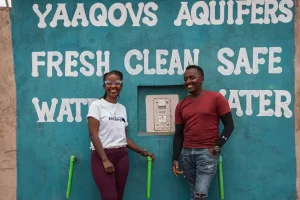Donald Trump vigorously pursued an “America First” approach during his administration, seeking to “return” the United States to its position as the world’s dominating force. As a result, help to poorer countries has been reduced.
In 2021, the United Kingdom also announced a 66 percent reduction in aid to African countries. This coincided with a downward trend in aid to developing countries, notably African countries.
For a long time, talks regarding Africa’s development were usually centered on aid. That strategy hasn’t worked out well, according to analysts, who believe it has bred a culture of dependency. African tech, on the other hand, appears to be altering all of that, with venture-backed investments soaring as a result of incredible levels of creativity across the continent.
Jim Chu believed that volunteering with development organizations was his way of making a difference in the world as a volunteer in Nigeria with Doctors Without Borders, a non-profit dedicated to delivering medical personnel to neglected areas. He soon realized, however, that assisting firms in obtaining the capital they require to expand their operations was a better option. Untapped Global was founded in 2020 as a result of this realization.
“We founded Untapped to address a gap that I witnessed repeatedly as an investor and entrepreneur in Haiti, Kenya, South Africa, and other locations.” Some call it the ‘Valley of Death’ or the ‘Missing Level,’ but it’s the gap between being a startup and being a well-established corporation. You’re in the middle, and firms at this point have a terrible time raising capital; it’s much more difficult if you’re not following the typical investing thesis,” Chu explains.
Contents
Using smart asset finance to democratize prosperity
Because most venture money goes to firms that can expand at stratospheric rates, such as fintech, other businesses that may provide significant value are finding it difficult to get funds. To address this void, Untapped Global was formed. Untapped Global invests in assets that have the potential to generate economic value, as opposed to traditional investment techniques.
Consider the case of Taiwo, a young guy from a community in Southern Nigeria who has recently relocated to Lagos. He is unable to obtain a good job due to his lack of education. His lack of credit history also prevents him from obtaining a loan to start a business.
A business supported by Untapped Global might provide Taiwo with a tricycle for commercial transportation using data from IoT devices. The tricycle would be tracked to see how successfully Taiwo makes use of it. If he does not make a profit with it, the corporation takes it back and sells it to someone else. Untapped Global invests in these businesses and earns a share of their income in return.
Untapped Global’s operation is explained by Chu.
“The traditional approach to risk management is to show me your balance sheets.’ ‘Show me what you’ve got.’ So you have a house, and you take out a loan against it, and we sign a bunch of paperwork so that if you don’t pay me back, we’ll send a bunch of attorneys to make sure you do or I’ll take your house.
“While not everyone has a home or an item that may be used as collateral, everyone has energy.” Instead, we utilize statistics to say things like, “OK, you don’t have a house, but you can ride a motorcycle.” The motorbike is the asset we offer you, and we utilize IoT to track it and manage risk using the data you create from it.'”
He revealed that the firm does not only use smart asset financing as an investment tool, has made equity investments in companies such as Opibus, a Kenyan electric vehicle company; Paga, a Nigerian fintech startup; Flexclub, a South African car financing company; Eden Life; OnePipe; Inspira Farms; and Asaak, a Ugandan motorcycle financing company.
Untapped Global invests how much?
Untapped Global has no average ticket size due to its significantly unusual investment methodology. Instead, it makes investments in its portfolio firms ranging from $50,000 to $3 million.
“There is no typical ticket size since the ticket sizes are connected to our due diligence procedure,” he explains.
When a firm expresses interest in being funded by an investor, the investor often does due diligence to determine whether the company is worth investing in. Untapped Global takes a unique approach to this.
Instead of a traditional due diligence procedure, the firm begins a trial program in which it funds a company’s assets with $50,000 or more. The trial might last a few weeks, and the data gathered will be used to make an investment decision.
The most common blunders made by startups
When you decide to start a business, you are committing to a life of uncertainty. As a result, even the most seasoned entrepreneurs may make blunders. Chu feels that one of the most common blunders made by African entrepreneurs is failing to recognize the sort of finance required for their venture.

“I believe that many startup owners make the error of utilizing equity money to operate their businesses when they should be using non-dilutive financing or other types of non-equity finance.” If you’re a software business, you won’t require much CapEx, but if you’re a capital-intensive firm that relies on equity financing, you’ll eventually run out of cap table.”
On squandered possibilities, lost opportunities, and triumphs
Even if a due diligence procedure is strictly followed, venture funding might still go awry. Many enterprises sponsored by venture capitalists are likely to fail, as numerous businesses do not make it through the five-year mark. Because of Untapped Global’s unusual investing procedures, it can spot a faulty investment within weeks by putting it to the test before making a long-term commitment.
“Our data allows us to spot a bad investment in as short as a few weeks,” Chu explains, “and because we only hand out modest sums of money, we can turn off the financing at any time.”
Traditional VC firms, on the other hand, may have to wait a few months before realizing that an investment isn’t going as planned. Chu names FlexClub, Paga, and Asaak as some of Untapped Global’s best accomplishments, despite the fact that the company has only been investing businesses for two years.
Most African investors participate in a variety of businesses, but Untapped Global, according to Chu, is focused on transportation, water infrastructure, and energy. Its investing strategy also implies that it is not bound by certain fundraising rounds.


